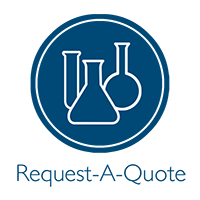This method has been used for the determination of formaldehyde in both textile dusts and wood dusts. Caution should be exercised in the way that data collected with this method are interpreted. These results should be reported separately from vapor-phase formaldehyde exposure data until sufficient data has been collected to allow appropriate epidemiological interpretation of formaldehyde-containing particulate exposures. The working range is 0.0004 to 3.8 mg/m³ for a 1050-L air sample.
No Obligation Quotation for Analytical Services
If you would like us to provide a quote for laboratory analysis, just provide us with as much information as you can about your project (the more, the better) and we'll provide you a quote via email. As you are searching or browsing our Analytical Guide, you'll see the Request-A-Quote icon... just click on it to start the request process.
| Hold Times, Preservatives, Preps, Collection, Analytical & Documentation | |
|---|---|
| Holding Time: | 21 days in cold storage |
| Preservatives: | Cold storage |
| Required Preps: | 25 mm PVC filter, 5 um pore size |
| Collection Method: | Institute of Occupational Medicine inhalable dust sampler, 240-1050 L @ 0.002 mg/m³, 2.0 L/min |
| Analytical Methodology: | HPLC/UV |
| Documentation: | |
| Analyte | Formula | CAS Number | Detection Limit | |
|---|---|---|---|---|
| Formaldehyde | CH2O |
50-00-0 |
0.08 |
µg |
* The analytes and detection limits listed for each method represent the typical detection limits and analytes reported for that particular method. Keep in mind that analyte lists may vary from laboratory to laboratory. Detection limits may also vary from lab to lab and are dependent upon the sample size, matrix, and any interferences that may be present in the sample.